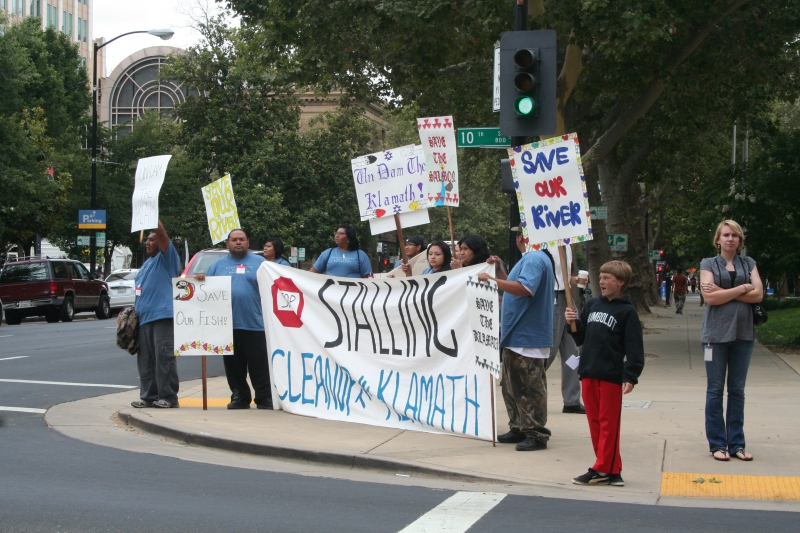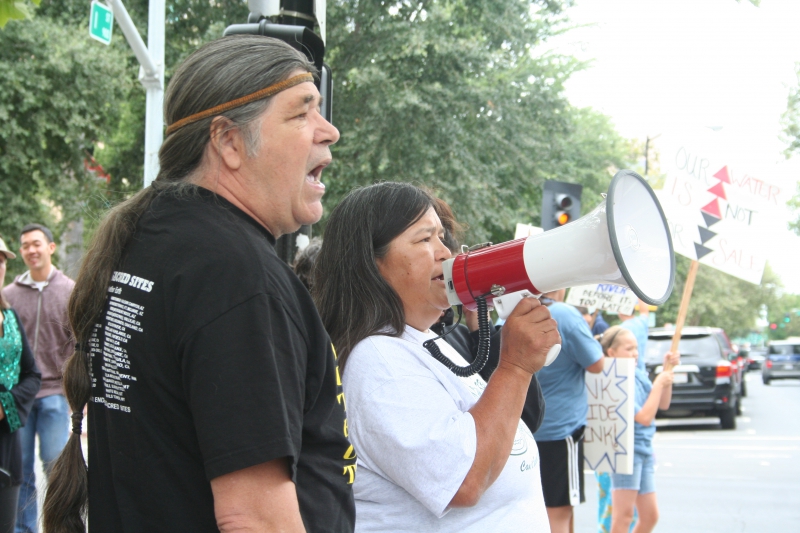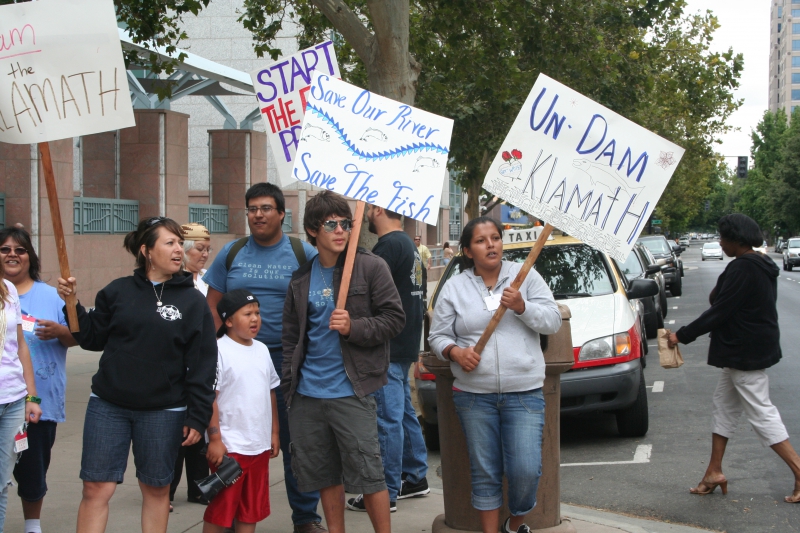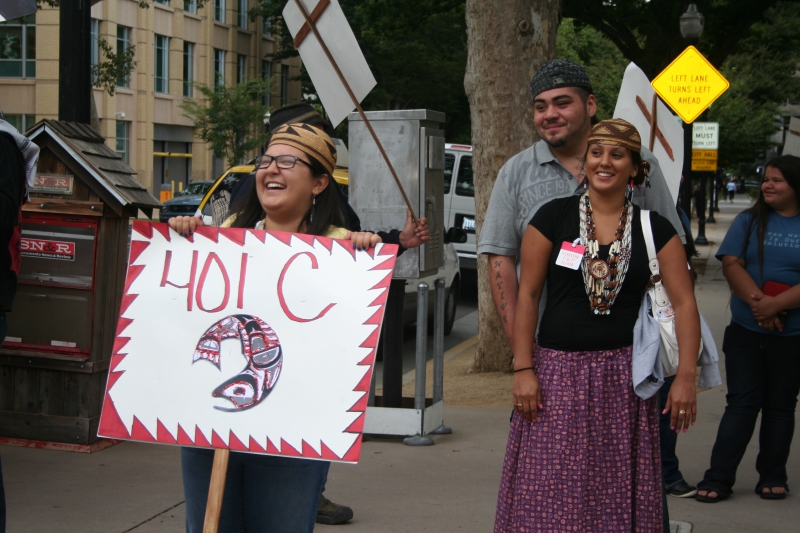From the Open-Publishing Calendar
From the Open-Publishing Newswire
Indybay Feature
Feds plan to release Trinity water to prevent Klamath fish kill
“For the Hoopa Tribe the salmon are no less important to us then the air we breathe,” said Hoopa Valley Tribal Chairman Leonard Masten, Jr. “We are as committed now to the recovery of the Klamath and Trinity salmon as we ever were, and we will support anyone working to find water for their recovery.”
Over 100 members of the Hoopa Valley and Resighini Tribes and their allies rallied for clean water on the Klamath in Sacramento on July 17. Photo by Dan Bacher.
Over 100 members of the Hoopa Valley and Resighini Tribes and their allies rallied for clean water on the Klamath in Sacramento on July 17. Photo by Dan Bacher.
Feds plan to release Trinity water to prevent Klamath fish kill
by Dan Bacher
In September 2002, I received a call from fishing guide Dan Carter that a massive fish kill was taking place on the lower Klamath River.
He soon turned the phone over to Walt Lara, Yurok Tribal Elder, who emphasized the scope of the disaster unfolding at the time.
"The fish kill is a lot worse than everybody thinks," said Walt Lara, then the Requa representative to the Yurok Tribal Council. "It's a lot larger than anything I've seen reported on the TV news or in the newspapers."
“The whole chinook run will be impacted, probably by 85 to 95 percent. And the fish are dying as we speak. They're swimming around in circles. They bump up against your legs when you're standing in the water. These are beautiful, chrome-bright fish that are dying, not fish that are already spawned out,” the shaken Lara told me.
An estimated 68,000 fish perished in the largest kill of adult salmon in U.S. history, spurred by low, warm water conditions resulting from Vice-President Dick Cheney’s intervention in the development of a 10-year water plan for the Klamath. (http://www.counterpunch.org/2007/07/16/cheney-and-the-klamath/)
Ten years later, the potential for another fish kill looms over the Klamath River. Biologists are forecasting four times more salmon than last year – and an astounding 15 times more than in 2006. The ocean salmon population is estimated to be 1.6 million adult Klamath River fall Chinook, compared to last year's forecast of 371,100.
Scientists forecast a record 380,000 Chinook salmon will return to the Klamath River this year. That is 250 percent more Klamath salmon than 2002, the year the fish kill occurred.
To prevent a fish kill from taking place again, the Hoopa Valley Indian Tribe and Humboldt County this spring requested that the Bureau of Reclamation release 50,000 acre feet of water, water the county has the right to, down the Klamath.
The Bureau of Reclamation rejected this request, but on Tuesday, July 17, they released a draft plan to release Trinity River water down the Klamath to forestall another fish kill from taking place this fall.
The Bureau said it released the “Draft Environmental Assessment and Draft Finding of No Significant Impact (EA/FONSI)" to use Trinity Reservoir-stored water to supplement flows in the lower Klamath River to "help protect returning adult salmon from a disease outbreak and mortality during late-summer 2012.”
“Projections of a near record-breaking run of adult fall Chinook salmon to the Klamath River Basin have prompted requests to supplement flows to the Lower Klamath River between August 15 and September 21,” said Pete Lucero, Bureau spokesman.
“Reclamation estimates up to 92,000 acre-feet of water could be used to supplement flows in the Lower Klamath River,” said Lucero. “Of this total, approximately 48,000 acre-feet could be used as a precautionary increase in flows to the Lower Klamath River, and up to 44,000 acre-feet could be used if an emergency situation were to occur.”
He noted that any use of the emergency water would be informed by "real-time" environmental and biological monitoring by federal, state and tribal biologists.
Tribes, environmentalists encouraged by plan
Tribal representatives are encouraged that the Bureau is releasing flows down the Trinity, but continue to urge the Bureau’s Klamath division to release the 50,000 cfs. down the Klamath.
“We are really excited that the Bureau has decided to put extra flow down the Trinity for Klamath salmon,” said Regina Chichizola, Communications Director for the Hoopa Valley Tribe. “But we also would like the Klamath BOR to release water down the Klamath River.”
“We’re glad that the Bureau will protect the migrating salmon up to the mouth of the Trinity,” she noted. “However, any salmon that will go past the Trinity will have to deal with low, warm flows from Iron Gate Dan. We want to make sure that all of the salmon are protected.”
Tom Stokely, water policy analyst for the California Water Impact Network, applauded the Bureau’s plan to release Trinity water.
“Clearly the unprecedented large run of Klamath-Trinity fall chinook is a combination of vastly improved conditions for salmon as a result of higher Trinity River flows since 2001 as well as good ocean conditions,” said Stokely.
“The vast cold water pool in Trinity Lake is the best tool to prevent a repeat of the disastrous 2002 Lower Klamath fish kill and it's been done before,” he stated. It's a rare example of the Bureau of Reclamation doing the right thing for salmon and steelhead fisheries in terms of providing water necessary for their survival.”
In a recent letter to Humboldt County and the Hoopa Valley Tribe, the BOR told the County and the Tribe that it would not let Humboldt County draw on the County’s own water right to 50,000 acre-feet of CVP water in Trinity Lake to protect the fish this year.
“I acknowledge that Humboldt County and the Hoopa Valley Tribe have made repeated requests to the Department of Interior regarding administering the 1959 contract for the release of 50,000 acre feet of water annually from the Trinity River,” said Michael L. Connor, Commissioner. “I regret that we have thus far been unable to provide you our response, but it remains under discussion at the highest levels of the Department.”
When Central Valley agribusiness interests came for the Trinity River’s water in 1955, Humboldt County saw the writing on the wall. In a show of vision for the time, the County fought the big water interests and won an entitlement to 50,000 acre feet of water from the Trinity River Division, according to a statement from the Hoopa Valley Tribe.
“Humboldt County secured this water on top of the language in the 1955 bill that conditioned the diversion of Trinity River water with the need to first protect fish and wildlife,” stated Ryan Sundberg, Humboldt County Board of Supervisor. “Yet this language, and our water right, were never respected, and soon 90% of the Trinity was going to the Central Valley. This took a huge toll on our fish runs, and our economy.”
“I’m happy that they’re releasing the water to hopefully avoid another fish kill,” said Sundberg. “Now it’s our job to make sure the water is released. We’re still pushing for the determination of Humboldt County having no less than 50,000 acre feet of water. Our position is that that this water is on top of the water than the current river is coming down the river.”
Regarding Humboldt County’s water, Leaf Hillman, Director of Natural Resources for the Karuk Tribe, said, “It’s absolutely a no-brainer that Humboldt County is entitled to the water. They should get it and should have been getting it – it’s long overdue.”
"We support the additional flows down the Trinity and have to keep a close eye on river conditions," said Troy Fletcher, Yurok Tribe policy analyst. "We have a long time position of supporting the 50,000 acre feet of water requested by Humboldt County."
Fletcher emphasized that the Tribe strongly supports the technical efforts of the Fish Response Team to stop a fish kill from taking place. "We, more than anybody else, have a heightened responsibility to protect the fish in the Klamath, since the fish kill took place in the lower river on the Yurok Reservation," said Fletcher.
Record of Decision restored Trinity flows
The record run expected on the Trinity and Klamath River this year is due to a number of factors, led by higher flows down the Trinity mandated under the historic Record of Decision and improved ocean conditions.
Massive diversions to irrigate drainage-impaired land on the west side of the San Joaquin Valley and provide water to power users continued until 2000 when the Hoopa Tribe, supported by legislation, a 14 year flow study, and multiple court rulings won back 47% of the Trinity’s flows.
“The 2000 Record of Decision restored flows to the river and funded a massive, scientifically based restoration project on the Trinity," stated Hoopa Valley Tribal Chairman Leonard Masten, Jr. “Unfortunately the decision was still being litigated when the 2002 Klamath fish kill happened."
The Trinity Management Council, who recently released a study calling for much higher fall flows in the Klamath -Trinity River to protect Klamath salmon, the Pacific Fisheries Management Council, several congressmen, sportfishing groups, and water managers in California have been supportive of the requests for more water down the Klamath to prevent a fish kill this fall.
“For the Hoopa Tribe the salmon are no less important to us then the air we breathe,” said Masten. “We are as committed now to the recovery of the Klamath and Trinity salmon as we ever were, and we will support anyone working to find water for their recovery.”
The draft documents (EA/FONSI) were prepared in accordance with the National Environmental Policy Act and are available at http://www.usbr.gov/mp/nepa/nepa_projdetails.cfm?Project_ID=10230. If you encounter problems accessing the documents online, please call 916-978-5100 or email mppublicaffairs [at] usbr.gov.
Please email comments by close of business Friday, July 27, 2012, to Don Reck at dreck [at] usbr.gov. Comments may also be mailed to Mr. Reck at Bureau of Reclamation, Northern California Area Office, 16349 Shasta Dam Blvd., Shasta Lake, CA 96019, or faxed to 530-276-2005.
For additional information or to request a copy of the Draft EA/FONSI, please contact Mr. Reck at 530-275-1554.
by Dan Bacher
In September 2002, I received a call from fishing guide Dan Carter that a massive fish kill was taking place on the lower Klamath River.
He soon turned the phone over to Walt Lara, Yurok Tribal Elder, who emphasized the scope of the disaster unfolding at the time.
"The fish kill is a lot worse than everybody thinks," said Walt Lara, then the Requa representative to the Yurok Tribal Council. "It's a lot larger than anything I've seen reported on the TV news or in the newspapers."
“The whole chinook run will be impacted, probably by 85 to 95 percent. And the fish are dying as we speak. They're swimming around in circles. They bump up against your legs when you're standing in the water. These are beautiful, chrome-bright fish that are dying, not fish that are already spawned out,” the shaken Lara told me.
An estimated 68,000 fish perished in the largest kill of adult salmon in U.S. history, spurred by low, warm water conditions resulting from Vice-President Dick Cheney’s intervention in the development of a 10-year water plan for the Klamath. (http://www.counterpunch.org/2007/07/16/cheney-and-the-klamath/)
Ten years later, the potential for another fish kill looms over the Klamath River. Biologists are forecasting four times more salmon than last year – and an astounding 15 times more than in 2006. The ocean salmon population is estimated to be 1.6 million adult Klamath River fall Chinook, compared to last year's forecast of 371,100.
Scientists forecast a record 380,000 Chinook salmon will return to the Klamath River this year. That is 250 percent more Klamath salmon than 2002, the year the fish kill occurred.
To prevent a fish kill from taking place again, the Hoopa Valley Indian Tribe and Humboldt County this spring requested that the Bureau of Reclamation release 50,000 acre feet of water, water the county has the right to, down the Klamath.
The Bureau of Reclamation rejected this request, but on Tuesday, July 17, they released a draft plan to release Trinity River water down the Klamath to forestall another fish kill from taking place this fall.
The Bureau said it released the “Draft Environmental Assessment and Draft Finding of No Significant Impact (EA/FONSI)" to use Trinity Reservoir-stored water to supplement flows in the lower Klamath River to "help protect returning adult salmon from a disease outbreak and mortality during late-summer 2012.”
“Projections of a near record-breaking run of adult fall Chinook salmon to the Klamath River Basin have prompted requests to supplement flows to the Lower Klamath River between August 15 and September 21,” said Pete Lucero, Bureau spokesman.
“Reclamation estimates up to 92,000 acre-feet of water could be used to supplement flows in the Lower Klamath River,” said Lucero. “Of this total, approximately 48,000 acre-feet could be used as a precautionary increase in flows to the Lower Klamath River, and up to 44,000 acre-feet could be used if an emergency situation were to occur.”
He noted that any use of the emergency water would be informed by "real-time" environmental and biological monitoring by federal, state and tribal biologists.
Tribes, environmentalists encouraged by plan
Tribal representatives are encouraged that the Bureau is releasing flows down the Trinity, but continue to urge the Bureau’s Klamath division to release the 50,000 cfs. down the Klamath.
“We are really excited that the Bureau has decided to put extra flow down the Trinity for Klamath salmon,” said Regina Chichizola, Communications Director for the Hoopa Valley Tribe. “But we also would like the Klamath BOR to release water down the Klamath River.”
“We’re glad that the Bureau will protect the migrating salmon up to the mouth of the Trinity,” she noted. “However, any salmon that will go past the Trinity will have to deal with low, warm flows from Iron Gate Dan. We want to make sure that all of the salmon are protected.”
Tom Stokely, water policy analyst for the California Water Impact Network, applauded the Bureau’s plan to release Trinity water.
“Clearly the unprecedented large run of Klamath-Trinity fall chinook is a combination of vastly improved conditions for salmon as a result of higher Trinity River flows since 2001 as well as good ocean conditions,” said Stokely.
“The vast cold water pool in Trinity Lake is the best tool to prevent a repeat of the disastrous 2002 Lower Klamath fish kill and it's been done before,” he stated. It's a rare example of the Bureau of Reclamation doing the right thing for salmon and steelhead fisheries in terms of providing water necessary for their survival.”
In a recent letter to Humboldt County and the Hoopa Valley Tribe, the BOR told the County and the Tribe that it would not let Humboldt County draw on the County’s own water right to 50,000 acre-feet of CVP water in Trinity Lake to protect the fish this year.
“I acknowledge that Humboldt County and the Hoopa Valley Tribe have made repeated requests to the Department of Interior regarding administering the 1959 contract for the release of 50,000 acre feet of water annually from the Trinity River,” said Michael L. Connor, Commissioner. “I regret that we have thus far been unable to provide you our response, but it remains under discussion at the highest levels of the Department.”
When Central Valley agribusiness interests came for the Trinity River’s water in 1955, Humboldt County saw the writing on the wall. In a show of vision for the time, the County fought the big water interests and won an entitlement to 50,000 acre feet of water from the Trinity River Division, according to a statement from the Hoopa Valley Tribe.
“Humboldt County secured this water on top of the language in the 1955 bill that conditioned the diversion of Trinity River water with the need to first protect fish and wildlife,” stated Ryan Sundberg, Humboldt County Board of Supervisor. “Yet this language, and our water right, were never respected, and soon 90% of the Trinity was going to the Central Valley. This took a huge toll on our fish runs, and our economy.”
“I’m happy that they’re releasing the water to hopefully avoid another fish kill,” said Sundberg. “Now it’s our job to make sure the water is released. We’re still pushing for the determination of Humboldt County having no less than 50,000 acre feet of water. Our position is that that this water is on top of the water than the current river is coming down the river.”
Regarding Humboldt County’s water, Leaf Hillman, Director of Natural Resources for the Karuk Tribe, said, “It’s absolutely a no-brainer that Humboldt County is entitled to the water. They should get it and should have been getting it – it’s long overdue.”
"We support the additional flows down the Trinity and have to keep a close eye on river conditions," said Troy Fletcher, Yurok Tribe policy analyst. "We have a long time position of supporting the 50,000 acre feet of water requested by Humboldt County."
Fletcher emphasized that the Tribe strongly supports the technical efforts of the Fish Response Team to stop a fish kill from taking place. "We, more than anybody else, have a heightened responsibility to protect the fish in the Klamath, since the fish kill took place in the lower river on the Yurok Reservation," said Fletcher.
Record of Decision restored Trinity flows
The record run expected on the Trinity and Klamath River this year is due to a number of factors, led by higher flows down the Trinity mandated under the historic Record of Decision and improved ocean conditions.
Massive diversions to irrigate drainage-impaired land on the west side of the San Joaquin Valley and provide water to power users continued until 2000 when the Hoopa Tribe, supported by legislation, a 14 year flow study, and multiple court rulings won back 47% of the Trinity’s flows.
“The 2000 Record of Decision restored flows to the river and funded a massive, scientifically based restoration project on the Trinity," stated Hoopa Valley Tribal Chairman Leonard Masten, Jr. “Unfortunately the decision was still being litigated when the 2002 Klamath fish kill happened."
The Trinity Management Council, who recently released a study calling for much higher fall flows in the Klamath -Trinity River to protect Klamath salmon, the Pacific Fisheries Management Council, several congressmen, sportfishing groups, and water managers in California have been supportive of the requests for more water down the Klamath to prevent a fish kill this fall.
“For the Hoopa Tribe the salmon are no less important to us then the air we breathe,” said Masten. “We are as committed now to the recovery of the Klamath and Trinity salmon as we ever were, and we will support anyone working to find water for their recovery.”
The draft documents (EA/FONSI) were prepared in accordance with the National Environmental Policy Act and are available at http://www.usbr.gov/mp/nepa/nepa_projdetails.cfm?Project_ID=10230. If you encounter problems accessing the documents online, please call 916-978-5100 or email mppublicaffairs [at] usbr.gov.
Please email comments by close of business Friday, July 27, 2012, to Don Reck at dreck [at] usbr.gov. Comments may also be mailed to Mr. Reck at Bureau of Reclamation, Northern California Area Office, 16349 Shasta Dam Blvd., Shasta Lake, CA 96019, or faxed to 530-276-2005.
For additional information or to request a copy of the Draft EA/FONSI, please contact Mr. Reck at 530-275-1554.
Add Your Comments
We are 100% volunteer and depend on your participation to sustain our efforts!
Get Involved
If you'd like to help with maintaining or developing the website, contact us.
Publish
Publish your stories and upcoming events on Indybay.
Topics
More
Search Indybay's Archives
Advanced Search
►
▼
IMC Network






